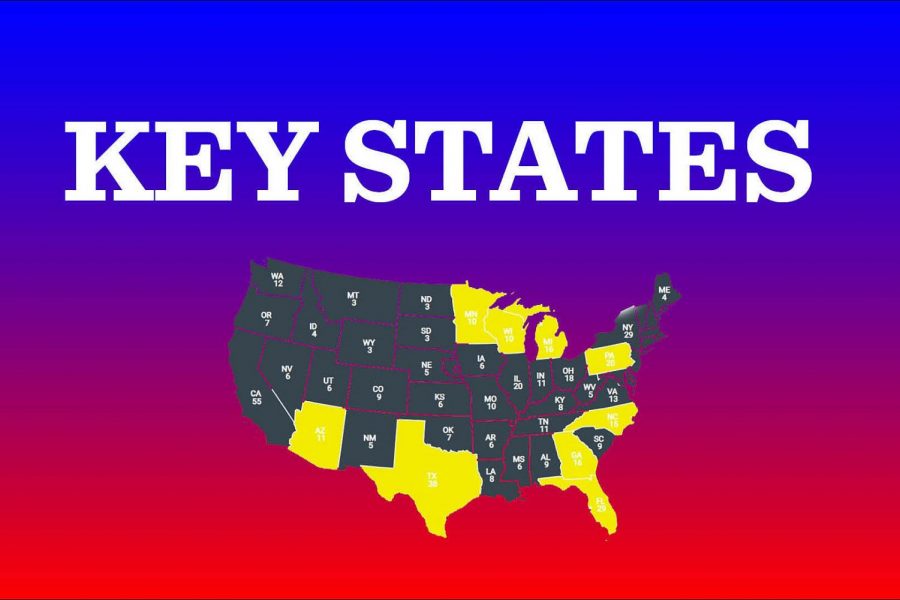Guide to watching important states on election night
Arizona, Florida, Georgia, Michigan, Minnesota, North Carolina, Pennsylvania, Texas and Wisconsin are cited as some of the most influential states for election day.
November 2, 2020
With unprecedented levels of mail-in ballots and increased voter turnout, conclusive results in the presidential election seem unlikely on election night, but there are a few key influential swing states and factors that could indicate early on which way the election will go.
To win the election, either President Donald Trump or former Vice President Joe Biden must take 270 votes in the Electoral College. According to the New York Times, winning the Electoral College will come down to the results of more than a dozen states. The Washington Post predicts few outcomes strongly favor a win for Mr. Trump, the Republican nominee, in contrast to the many for Mr. Biden, the Democratic nominee. To reach 270 votes, Mr. Trump would need to take some states that polls show are expected for Mr. Biden.
The New York Times broke down four possible outcomes, depending on how Mr. Trump and Mr. Biden do in key swing states. Arizona, Florida, Georgia, Michigan, Minnesota, North Carolina, Pennsylvania, Texas and Wisconsin. These states are cited as some of the most influential battlegrounds on election day.
Arizona holds 11 votes in the Electoral College. Although a red state since 2000, Arizona has been polling in favor of Mr. Biden. This is because of a gain in support from voters 65 and older. This support can be largely attributed to Mr. Trump’s response to the coronavirus pandemic. According to an article by the New York Times, a new Arizona law allowed for officials to begin counting ballots two weeks ago and results will be reported by Wednesday, Nov. 4.
Florida holds 29 votes in the Electoral College. Both Mr. Biden and President Trump spent Thursday, Oct. 28, in Florida, hoping to sway the state in their favor. Votes from mail-in and previously tabulated ballots are expected to be announced Tuesday evening, likely in favor of Mr. Biden. However, Mr. Trump is expected to gain votes from Election Day voters. The outcome is still too close to call, but Florida is an important state for Mr. Trump to hold on to if he hopes to take the Electoral College.
In Georgia, it is expected to take a couple days for mail-in ballots to be counted, but the secretary of state, who oversees elections, suggested results would be clear by Nov. 4. Georgia has 16 electoral votes and is expected to be a close margin. According to Politico and the New York Times, it is currently too close to call but is likely dependent on rural white voters.
Michigan also holds 16 electoral votes and their outcome is expected to be largely dependent on how many mail-in ballots are reported. If the state has not counted and reported a significant number of mail-in ballots by the end of election night, Michigan’s preliminary results will likely favor Mr. Trump. Yet, over the last several weeks, polls have indicated that Michigan voters are leaning toward Mr. Biden. Since Mr. Trump won this state in 2016 by just 10,704 votes, this is an important state for Mr. Trump to hold on to.
Minnesota has 10 Electoral College votes. Mr. Trump lost the state by just 1.5% in 2016 and is a possible state for Mr. Trump to take from Mr. Biden. According to the Washington Post, taking Minnesota could significantly help Mr. Trump win the election. A recent court ruling limits the state to only counting ballots that are cast or received by the time polls close. 100 percent of ballots cast on or before Election Day are expected to be counted by midday Wednesday.
North Carolina is another battleground state with 15 Electoral College votes. Mail-in and early ballots are expected to lean for Mr. Biden and will be reported by 6:30 p.m. CDT on election night. In-person voting is expected to lean toward Mr. Trump and will be reported between 7:30 p.m. and midnight CDT Mr. Trump won North Carolina in 2016, and it is an important state for him to hold on to.
Pennsylvania holds 20 electoral votes, is one of the tightest races and will not report all of its results quickly. It has experienced significant fluctuation in the polls between Mr. Biden and Mr. Trump over the last several months, though the polling average gives a slight edge to Mr. Biden. Both candidates spent the last day before Election Day in Pennsylvania. Officials cannot begin to process mail ballots until Election Day, so if there are many outstanding ballots, the early reports will likely favor Mr. Trump, who won the state by 44,292 votes in 2016.
Texas is a tossup state and has 38 electoral votes. Texas requires an excuse for voters to vote by mail, so there is not much expected delay due to mail-in ballots, though approximately 10 million votes were cast early by mail or in person, and this greater turnout may slow down or delay the reporting process.
Wisconsin holds 10 votes in the Electoral College and was an upset win for Mr. Trump in 2016 when he won by 22,748 votes. An average of polls puts Wisconsin favoring Mr. Biden. Mr. Trump can afford to lose Wisconsin if he holds on to other higher influence states such as Pennsylvania and Texas.












